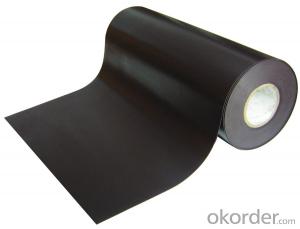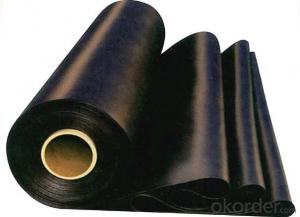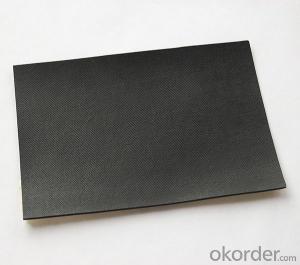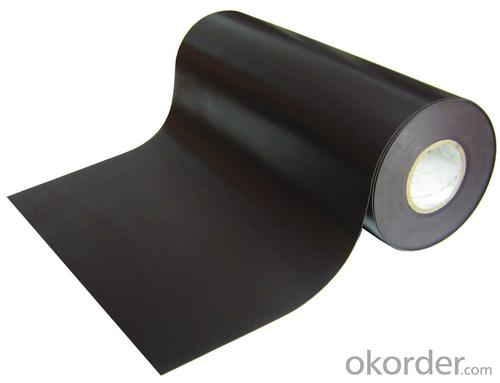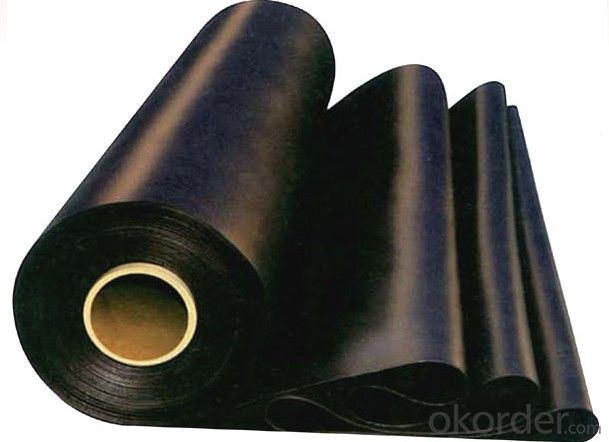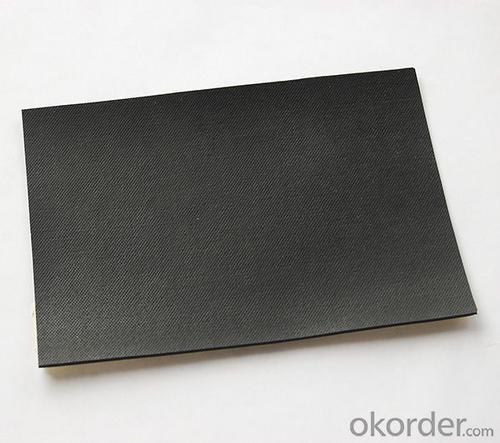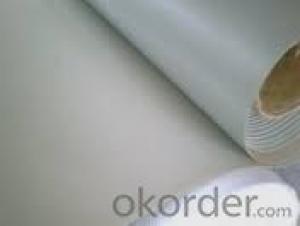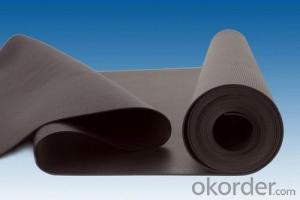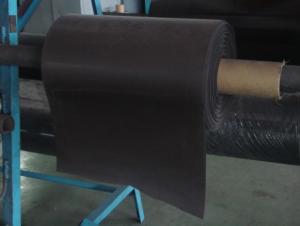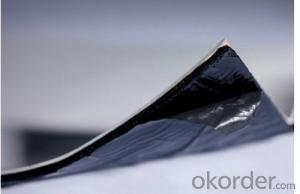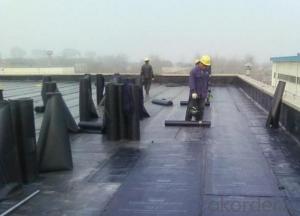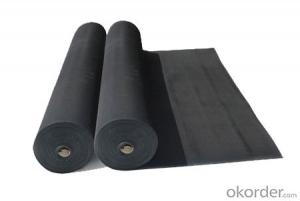EPDM Weldable Waterproofing Membrane for Underground Roof
- Loading Port:
- China main port
- Payment Terms:
- TT OR LC
- Min Order Qty:
- 5000 m²
- Supply Capability:
- 100000 m²/month
OKorder Service Pledge
OKorder Financial Service
You Might Also Like
Introduction for EPDM Waterproofing Membrane:
It is a kind of self-adhesive waterproof coiled material based on polymer rubber and superior asphalt, together with polyethylene film and aluminum foil as surface material or no film(Double-sided self-adhesive). And it adopts the package preventing-adhesion-isolation-layer package, and dividing into no fiber and polyester fiber two parts.The coiled material has perfect performances, simple operation, non-pollution and etc.
Characteristic of EPDM Waterproofing Membrane:
1>Excellent anti-aging performance, service life up to 50 years
2>Working well with in -40°C to 100°C,it can be constructed with a single layer in ambient temperature. 3>Waterproofing on various kinds of underground project,industrial of civil buildings and structures. 4>high extension rate, high tensile strength, small size changes at heat treatment
5>Good plant roots penetrability resistance and can be made waterproofing layer of planting roof
6>Special modified molecular structure ,effectively resolving the current domestic and foreign glue joint problem . 7>Good low temperature flexibility, and good performance of adapting to ambient temperature changes. 8>Convenient application ,solid joint, no environment pollution
9>chemical corrosion Resistance, can be used for special occasions
Specification of EPDM Waterproofing Membrane:
Item | Thickness(mm) | Width(mm) | Length(m) | Color |
1.0—2.0 | 1200 | 20 | Black | |
Deviation | -1 +15 | --1 | Multicolor |
FAQ of Waterproofing Membrane
a.Can we get some samples before place order?
Answer: We can send the free samples to you by freight collect.
b.How many years can your PVC membrane guarantee?
Answer: We will guarantee the quality for 5 years at least.
c.Which countries you ever export the product?
Answer: We export the PVC membrane to South Africa, Middle east and even European countries.
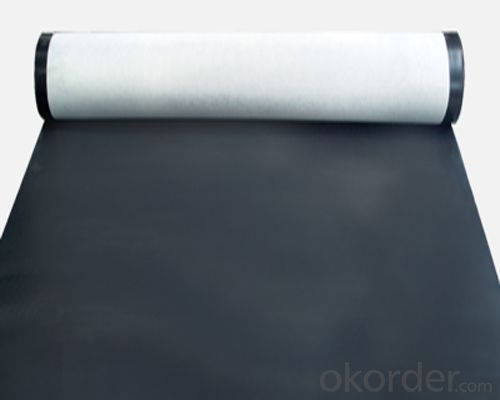
- Q: Can a waterproofing membrane be installed on a concrete foundation?
- Yes, a waterproofing membrane can be installed on a concrete foundation. Waterproofing membranes are commonly used to protect concrete foundations from water damage and to prevent moisture from seeping into the building. The membrane is applied directly onto the foundation to create a barrier against water penetration.
- Q: Can a waterproofing membrane be used in areas with heavy foot traffic?
- Yes, a waterproofing membrane can be used in areas with heavy foot traffic. In fact, many waterproofing membranes are specifically designed to withstand heavy use and abuse, making them ideal for high-traffic areas such as walkways, balconies, and parking decks. These membranes are typically made from durable materials like rubber, PVC, or modified bitumen, which are resistant to wear and tear. Additionally, some membranes have a slip-resistant surface to improve safety in areas where people are walking. It's important to choose a waterproofing membrane that is suitable for the specific application and meets the required durability standards to ensure long-lasting protection in areas with heavy foot traffic.
- Q: Can a waterproofing membrane be used for oil or gas industry applications?
- The oil or gas industry can utilize a waterproofing membrane for various applications. These membranes are specifically designed to create a barrier against water penetration, making them highly advantageous in industries where oil or gas leaks and spills pose a significant concern. By preventing water from seeping into underground storage tanks or pipelines, these membranes safeguard against corrosion and potential environmental contamination. Moreover, they can be employed in areas where water might come into contact with oil or gas, such as containment areas or waste treatment facilities, ensuring that no substances escape into the surrounding environment. In summary, waterproofing membranes provide a dependable solution for safeguarding oil or gas industry infrastructure against water-related harm, thereby contributing to the integrity and safety of these operations.
- Q: Can a waterproofing membrane be used in areas with high water pressure?
- Yes, a waterproofing membrane can be used in areas with high water pressure. Waterproofing membranes are designed to withstand and prevent water penetration, making them suitable for use in areas where there is high water pressure. However, it is important to ensure that the membrane chosen is specifically rated and designed to handle the specific water pressure levels in order to ensure its effectiveness and durability.
- Q: Can a waterproofing membrane be used for podium decks and plaza areas?
- Yes, a waterproofing membrane can be used for podium decks and plaza areas. Waterproofing membranes are designed to provide a protective barrier against water and moisture, and are commonly used in a variety of applications including roofs, basements, and decks. Podium decks and plaza areas are also exposed to water and weather elements, making them suitable candidates for waterproofing membrane installation. The membrane acts as a waterproof layer, preventing water from penetrating the underlying structure and causing damage. It also helps to maintain the integrity and longevity of the deck or plaza by protecting it from moisture-related issues such as leaks, mold, and deterioration. Additionally, waterproofing membranes are available in various types and materials, allowing for flexibility in choosing the most appropriate membrane for the specific project requirements.
- Q: Are waterproofing membranes resistant to salt damage?
- Yes, waterproofing membranes are generally resistant to salt damage. They are designed to protect against moisture and other environmental factors, including saltwater. The membranes are specifically engineered to provide a barrier that prevents water and salts from infiltrating and causing damage to underlying structures.
- Q: Can a waterproofing membrane be used on nickel surfaces?
- Yes, a waterproofing membrane can be used on nickel surfaces. The membrane will provide a protective barrier against moisture and prevent water penetration into the nickel surface.
- Q: Can a waterproofing membrane be used on precast concrete block surfaces?
- Precast concrete block surfaces can benefit from the application of a waterproofing membrane. These membranes are commonly used to safeguard below-grade structures, like basements and foundations, from water infiltration. When constructing these structures, precast concrete blocks are frequently utilized, and the use of a waterproofing membrane can prevent water from seeping into the concrete and causing harm. The membrane acts as a barrier, prohibiting water from passing through while still allowing the concrete to breathe and release any accumulated moisture. Furthermore, waterproofing membranes can enhance the overall durability and lifespan of precast concrete blocks by shielding them from moisture-related problems such as cracking, spalling, and corrosion. It is crucial to select a waterproofing membrane that is specifically designed for below-grade applications and is compatible with concrete surfaces to ensure proper adhesion and long-term efficacy.
- Q: Can a waterproofing membrane be used in roofs?
- Yes, a waterproofing membrane can be used in roofs. In fact, it is a commonly used method for protecting roofs from water damage. A waterproofing membrane is typically made of a durable material, such as rubber or modified bitumen, and is applied to the roof surface to create a barrier against water penetration. This membrane acts as a protective layer that prevents water from seeping into the underlying structure of the roof, thus preventing leaks and potential damage. Waterproofing membranes are especially useful for flat or low-sloped roofs, where water can easily accumulate and cause problems. Additionally, these membranes can be applied to various types of roofing materials, including concrete, metal, and asphalt, making them versatile and suitable for different roof types. Overall, using a waterproofing membrane in roofs is an effective way to enhance their durability and longevity, while also providing reliable protection against water infiltration.
- Q: Can a waterproofing membrane be installed on wood surfaces?
- Yes, a waterproofing membrane can be installed on wood surfaces. Waterproofing membranes are commonly used on various surfaces including wood, concrete, and metal. When applied to wood surfaces, the membrane acts as a protective barrier, preventing water from seeping into the wood and causing damage such as rot, warping, or decay. It is important to choose a waterproofing membrane that is specifically designed for wood, as some products may not be suitable for this surface. Additionally, proper surface preparation and application techniques should be followed to ensure a strong and effective bond between the membrane and the wood surface.
Send your message to us
EPDM Weldable Waterproofing Membrane for Underground Roof
- Loading Port:
- China main port
- Payment Terms:
- TT OR LC
- Min Order Qty:
- 5000 m²
- Supply Capability:
- 100000 m²/month
OKorder Service Pledge
OKorder Financial Service
Similar products
Hot products
Hot Searches
Related keywords
